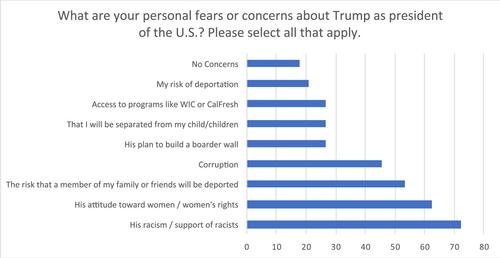Sociopolitical stressors are associated with psychological distress in a cohort of Latina women during early pregnancy
Abstract
Research suggests that the 2016 US election was a potential stressor among Latinos residing in the United States. Sociopolitical stressors targeted toward ethnic minority communities and become embodied through psychosocial distress. The current study investigates if and how sociopolitical stressors related to the 45th President, Donald Trump, and his administration are associated with psychological distress in early pregnancy of Latina women living in Southern California during the second half of his term. This cross-sectional analysis uses data from the Mothers' Cultural Experiences study (n = 90) collected from December 2018 to March 2020. Psychological distress was assessed in three domains: depression, state anxiety, and pregnancy-related anxiety. Sociopolitical stressors were measured through questionnaires about sociopolitical feelings and concerns. Multiple linear regression models examined the relationship between sociopolitical stressors and mental health scores, adjusting for multiple testing. Negative feelings and a greater number of sociopolitical concerns were associated with elevated pregnancy-related anxiety and depressive symptoms. The most frequently endorsed concern was about issues of racism (72.3%) and women's rights (62.4%); women endorsing these particular concerns also had higher scores on depression and pregnancy-related anxiety. No significant associations were detected with state anxiety after correction for multiple testing. This analysis is cross-sectional and cannot assess causality in the associations between sociopolitical stressors and distress. These results are consistent with the hypothesis that the 2016 election, the subsequent political environment, and the anti-immigrant rhetoric and policies of former President Trump and his administration were sources of stress for Latinos residing in the United States.


 求助内容:
求助内容: 应助结果提醒方式:
应助结果提醒方式:


